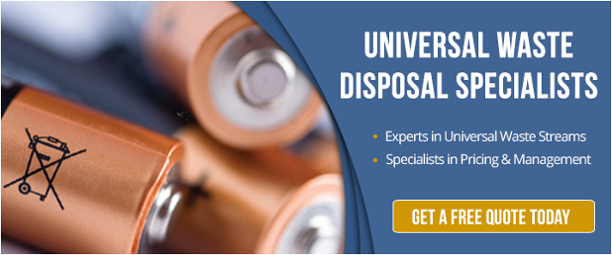One of the more confusing aspects of managing waste streams for hazardous waste generators is understanding the terminology used by the Environmental Protection Agency (EPA) and how a classification impacts how each type of waste must be handled.
Universal waste is one of those confusing terms. The word universal means a term or concept of general application. In other words, it can be thought of as a catch all type of phrase.
Yet understanding exactly how the term applies to your business is important in ensuring compliance with federal and state regulations.
EPA Definition of Universal Waste
Universal wastes are hazardous waste items commonly disposed by households and small businesses in the solid waste stream.
waste stream.
The EPA defines universal waste as a category of hazardous waste that is widely produced by households and businesses but poses a lower risk compared to other hazardous wastes. This classification allows for simplified, less-stringent regulatory requirements to encourage proper disposal and recycling. Universal wastes are items that contain hazardous substances but are common enough to need special handling rules for ease of compliance.
EPA has designated four specific waste streams that are known as “universal wastes”:
- Batteries: Commonly used types like lead-acid, nickel-cadmium and lithium batteries are included when they become waste.
- Pesticides: Certain recalled, suspended or unused pesticides that need disposal are covered under this category.
- Mercury-Containing Equipment: This includes items such as thermometers, thermostats and other devices with elemental mercury found in industrial waste.
- Lamps: Fluorescent bulbs, high-intensity discharge lamps and other bulbs containing mercury or other hazardous materials fall into this category.
Under the EPA’s universal waste regulations, the focus is on facilitating the safe collection, transport, and recycling of these wastes by reducing the complexity of managing them, without sacrificing environmental safety. This approach aims to prevent improper disposal in landfills and to streamline processes for entities that generate these wastes frequently.
These classifications are meant to streamline the management and disposal of these widely produced wastes, making compliance simpler for businesses while ensuring proper environmental protection.
The Federal Universal Waste Program
The Federal Universal Waste Disposal Program was developed to encourage recycling and proper disposal of these wastes, which meet the Federal criteria for hazardous waste but are widely generated and typically do not pose an immediate and undue risk.
Universal wastes are subject to less stringent standards for handling, storage and transport. However, full hazardous waste requirements remain for the final recycling, treatment or disposal of these wastes.
Specific UWR requirements vary based on the volume of universal waste handled or generated, so generators are encouraged to review the rule and seek additional information as needed from the U.S. EPA and their local and state authorities.
EPA’s universal waste regulations streamline the hazardous waste management standards. The EPA objectives for streamlined regulations includes:
- Promoting the collection and recycling of universal waste,
- Easing the regulatory burden on retail stores and other generators that wish to collect these wastes and universal waste transporters of these wastes, and
- Encouraging the development of municipal and commercial programs to reduce the quantity of these wastes going to municipal solid waste landfills or combustors.
It’s important for companies to understand their requirements concerning universal waste streams. A good place to start out with your company is to ensure that all employees are properly trained in universal waste handling regulations and that there is a clear understanding of the different regulations.
Doing this will help your company avoid potentially dangerous and costly universal waste violations. Yet understanding and implementing the full scope of universal waste requirements can still be complex, especially as regulations evolve and vary across regions.
A hazardous waste disposal company can help bridge this gap by providing expert guidance on compliance, handling logistics and ensuring safe, environmentally friendly disposal methods tailored to your company’s needs.
How A Disposal Company Can Help Manage Your Universal Waste
Partnering with a hazardous waste disposal company can make universal waste management significantly easier and more compliant. Here’s are some of the benefits hazardous waste disposal companies offer.
more compliant. Here’s are some of the benefits hazardous waste disposal companies offer.
Regulatory Expertise
Disposal companies specialize in the latest federal, state and local regulations concerning universal waste. They can guide your business through these complex requirements, helping you understand what’s needed to stay compliant and avoid potential fines or violations. This expertise is particularly valuable when regulations change or differ between locations.
Employee Training
A disposal company can provide training programs for your employees, ensuring they understand how to properly handle, store, and transport universal waste. This training can reduce the risk of accidental mishandling and help your team spot potential compliance issues before they become costly mistakes.
Efficient Collection and Transportation
Disposal companies have the resources and logistics networks to collect universal waste efficiently and transport it safely. They follow EPA guidelines for transport, minimizing environmental impact and handling items such as batteries, lamps, or mercury-containing equipment in ways that reduce the chance of spills or contamination.
Recycling and Disposal Services
Many disposal companies offer recycling options for universal wastes, like batteries or mercury-containing devices, helping to divert materials from landfills. They can ensure that these wastes are processed in environmentally responsible ways, often reclaiming reusable materials and safely handling hazardous substances.
Documentation and Record-Keeping
Proper record-keeping is essential for universal waste compliance. Disposal companies can help by providing thorough documentation for every step of the process—from collection and transport to disposal or recycling. This documentation can be crucial if your business undergoes regulatory audits.
Customized Waste Management Solutions
Every business generates waste differently, and a disposal company can offer customized solutions to match your specific needs. From setting up collection schedules to designing storage areas and helping you choose waste destination facilities, they can work with you to create a system that keeps waste management simple, safe, and compliant.
By leveraging the services of a hazardous waste disposal company that is also a universal waste handler, your business can streamline universal waste management, reduce environmental impact, and focus on core operations without the stress of regulatory compliance.


Comment